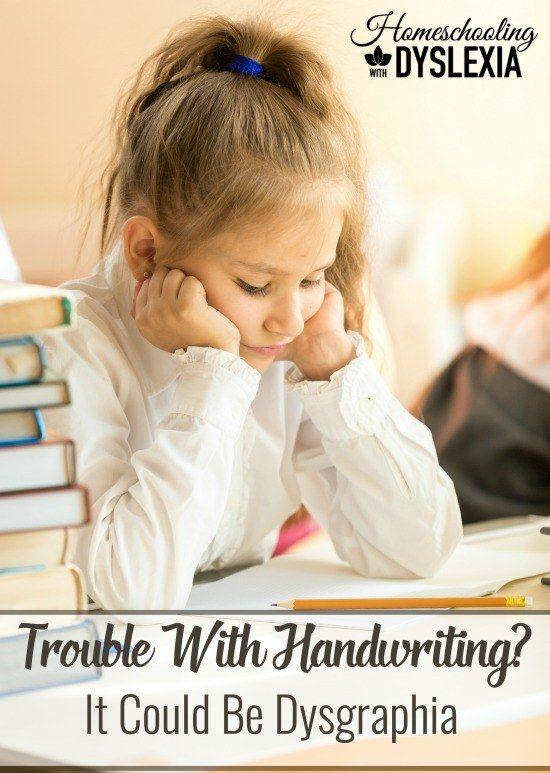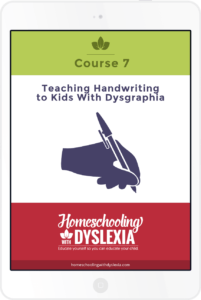
The longer I teach my kids with dyslexia, the more I understand the many areas that are affected by this subtle wiring difference in the brain. Take handwriting for example. Just as kids with dyslexia have unexpected trouble with reading, kids with dysgraphia have unexpected trouble with handwriting.
The two struggles often come together, likely because the two skills are controlled in the same area of the brain. (The prefrontal cortex, if you really want to know.)
If your child is having difficulties with handwriting, copying, or even organizing their thoughts to write – it could be because of dysgraphia.
Signs of Dysgraphia
Your child may have dysgraphia if his writing skills lag behind those of his peers and he has at least some of these symptoms:
In Early Writers
Tight, awkward pencil grip and body position
Avoiding writing or drawing tasks
Trouble forming letter shapes
Inconsistent spacing between letters or words
Poor understanding of uppercase and lowercase letters
Inability to write or draw in a line or within margins
Tiring quickly while writing
In Young Students
Illegible handwriting
Mixture of cursive and print writing
Saying words out loud while writing
Concentrating so hard on writing that comprehension of what’s written is missed
Trouble thinking of words to write
Omitting or not finishing words in sentences
In Teenagers and Adults
Trouble organizing thoughts on paper
Trouble keeping track of thoughts already written down
Difficulty with syntax structure and grammar
Large gap between written ideas and understanding demonstrated through speech
What to do if Your Child has Dysgraphia
There is help for kids with dysgraphia. Help is a 3-pronged approach:
- Modifications: changing handwriting requirements for example, not requiring written schoolwork for a time
- Remediation: strengthening the underlying weaknesses causing handwriting difficulties
- Accommodations: allowing the use of tools to help with weak handwriting skills such as text-to-speech programs or allowing dictation of written work
For more information on how I teach writing to my kids with dysgraphia, read this post that details step-by-step how I gently teach writing.
To better understand the many factors that affect dysgraphia and how to strengthen those areas of weakness, see our parent class:
Find the Help Your Child With Dysgraphia Needs
The way to help your child to become a competent writer is:
- to understand what dysgraphia is
- learn what causes dysgraphia
- learn proven methods for teaching, and mastering handwriting
You will find all of that in this online course, Teaching Writing to Kids With Dysgraphia.
Visit our courses page for information on our other parent classes.







How do I know that my son has dysgraphia?
I find that many children who have previously not been home schooled have poor writing due to lack of adequate teaching. The lack of cursive writing tuition can result in kids making up their own letters or writing at unusual angles. This can make parents wonder if they have dysgraphia.
My adult son hates writing and it is not legible. He will avoid filling out forms and times sheets and is embarrassed when people see how he prints. He is smart, he has a lot to offer to the world, but his handwriting is holding him back!